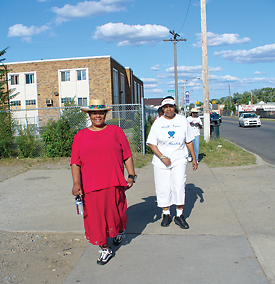Related stories:
U-M students learn, engage through Semester in Detroit >
About 350 Detroit residents have participated in organized walks — 350 residents who otherwise might have remained sedentary if not for the walking program created by the Healthy Environments Partnership (HEP).
HEP was established by the School of Public Health (SPH) and community-based organizations and health services groups in Detroit to understand how the environment affects the cardiovascular health of Detroit residents. A steering committee of members from the various community partners and SPH oversees the group’s priorities, creates projects and thinks about how to apply results to promote health in Detroit.
Amy Schulz, who presented the program at the Board of Regents meeting March 17 in Detroit, says one of the critical components to successful community-based research is emphasizing the strengths of the community.
“There are tremendous strengths in Detroit,” says Schulz, one of HEP’s founding members and U-M associate professor of public health. “There are active and engaged community and faith-based organizations that are committed to promoting the health and well-being of the residents.”
The walking program, called CATCH-PATH (Community Approaches to Cardiovascular Health: Pathways to Heart Health) is one of five programs HEP has developed since its inception in 2000. The Walk Your Heart to Health walking groups meet three times a week at different churches and community organizations. Participants have seen significant drops in blood pressure in just an eight-week period and the partnership hopes to involve 550 residents, Schulz says.

Detroit residents enjoy group walks in CATCH-PATH (Community Approaches to Cardiovascular Health: Pathways to Heart Health). It’s one of the five programs the Heathly Environments Partnership has developed since its inception in 2000. Photo courtesy Healthly Environments Partnership.
CATCH-PATH also provides assistance to groups to start and lead walking groups, and offers funding to community groups to enhance neighborhoods to promote active living. HEP also develops and disseminates information to policymakers about ways to promote and build environments that are conducive to physical activity and improved heart health.
Another HEP program, Social and Physical Environments and Cardiovascular Health Disparities, looks at the link between air quality and cardiovascular risk in Detroit. In some areas of Detroit (near incinerators, freeways and industrial areas), people are exposed to higher airborne particulate matter, which has cardiovascular implications, Schulz says. The group developed information sheets for policymakers and encourages them to consider that information as they decide land-use issues in Detroit.

